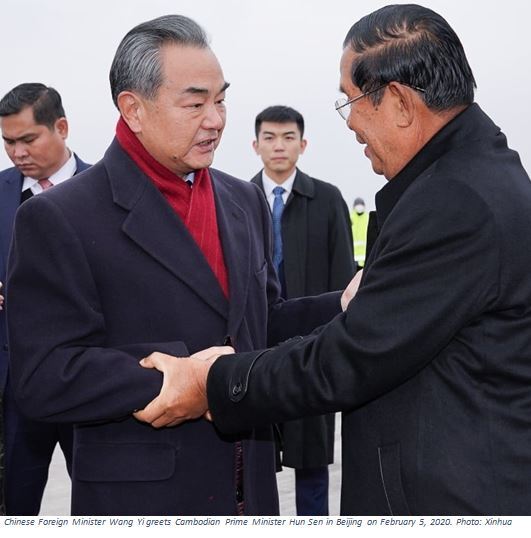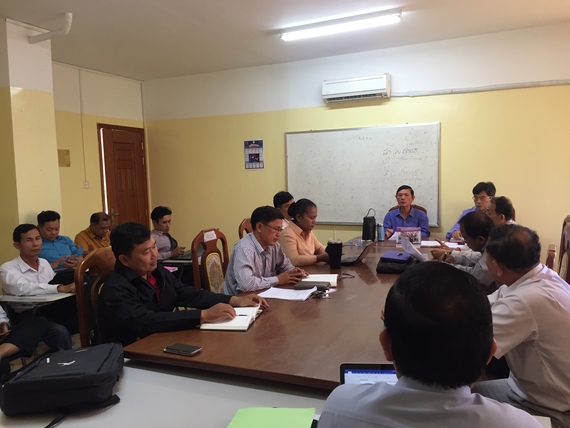The visit of Chinese Foreign Minister Wang Yi in Cambodia from August 12-13, 2023 holds immense significance, not only for the bilateral relations between the two nations but also for the broader regional dynamics in Southeast Asia. As China's to p diplomat, Wang Yi's visit demonstrates the importance that China places on its relationship with Cambodia and its commitment to fostering stronger ties with its neighbors.
Cambodia, located in the heart of Southeast Asia, has long been an important partner for China. The historical and cultural connections between the two countries date back centuries, and in recent years, their economic cooperation has flourished. China has become one of Cambodia's largest trade partners and investors, contributing significantly to the country's development and growth.
This visit comes at a critical time after the general election in Cambodia. The visit of Foreign Minister Wang Yi signifies China's continued support for Cambodia's development agenda and its commitment to enhancing the region's stability and prosperity.
Furthermore, this visit holds broader implications for the regional geopolitical landscape. China's increasing influence in Southeast Asia has been a subject of international attention, with its ambitious Belt and Road Initiative (BRI) and growing economic presence in the region. Wang Yi's visit to Cambodia can be seen as a strategic move to strengthen China's ties within ASEAN (Association of Southeast Asian Nations) and consolidate its position as a major player in the region.
The bond between China and Cambodia has been further strengthened through cultural exchange programs, educational scholarships, and people-to-people exchanges. These initiatives have not only deepened understanding and friendship between the two countries but have also fostered cultural appreciation and cross-cultural collaboration.
The visit of Chinese Foreign Minister Wang Yi to Cambodia serves as a testament to the enduring friendship and strategic partnership between the two nations. It provides an opportunity for both countries to further strengthen their ties, explore new avenues of collaboration, and address shared challenges.
During his visit, Minister Wang Yi has set clear objectives and expectations to further enhance the bilateral relationship. One of the key objectives is to deepen economic cooperation and trade ties between China and Cambodia. This includes exploring new avenues for investment, promoting trade facilitation, and expanding bilateral trade volumes. China's Belt and Road Initiative, a grand infrastructure project aimed at enhancing connectivity and trade across Asia, will likely be a focal point of discussion during the visit.
In addition to economic cooperation, Minister Wang Yi is expected to discuss regional and international issues of mutual concern. Cambodia, being a member of the Association of Southeast Asian Nations (ASEAN), plays a crucial role in promoting regional stability and cooperation. Therefore, discussions on regional security, maritime disputes, and cooperation within ASEAN are anticipated.
Another significant aspect of Minister Wang Yi's visit is to reaffirm China's commitment to supporting Cambodia's domestic development agenda and to express the willing to support the new prime minister of Cambodia, Hun Manet, and also to show that China will be the good friends of Cambodia in all generations. China has been a major development partner for Cambodia, assisting in infrastructure projects, agriculture, education, and healthcare. The visit provides an opportunity to discuss ongoing projects and explore new avenues of cooperation, particularly in areas such as tourism, technology transfer, and human resource development.
The visit also has implications for the regional dynamics in Southeast Asia. China's increasing influence in the region has raised concerns among some neighboring countries, especially in light of territorial disputes in the South China Sea. Wang Yi's visit to Cambodia can be seen as a strategic move by China to strengthen its alliances and gain support from Cambodia, which has been regarded as a close ally in the region. This may have implications for the balance of power and regional dynamics in Southeast Asia.
The visit of Chinese Foreign Minister Wang Yi to Cambodia has garnered significant attention from other countries and stakeholders in the international community. As one of the most influential nations in Southeast Asia, Cambodia's strategic importance cannot be underestimated, making it a focal point for diplomatic relations and regional cooperation.
Neighboring countries have been closely observing Wang Yi's visit, as it signifies China's continued efforts to strengthen its ties with Cambodia and expand its influence in the region. For countries with existing alliances or partnerships with Cambodia, such as Vietnam and Thailand, this visit may raise concerns about the potential impact on their own relationships with the Southeast Asian nation.
Beyond the immediate region, global powers are also taking note of this visit. The United States, for instance, has been closely monitoring China's activities in Southeast Asia and may view this visit as another step in China's broader geopolitical ambitions. As the rivalry between the United States and China continues to unfold, any moves by China to deepen its relationships with regional allies are likely to attract attention and scrutiny.
International organizations and stakeholders invested in regional stability and development are also following Wang Yi's visit closely. The Association of Southeast Asian Nations (ASEAN), for example, plays a crucial role in facilitating dialogue and cooperation among its member states. As China seeks to strengthen its ties with individual ASEAN countries, it may have implications for the dynamics within the regional organization and its broader agenda.
Minister Wang Yi's visit served as a platform to reaffirm the commitment of both China and Cambodia to deepening their strategic partnership. The discussions held during the visit emphasized the importance of maintaining peace and stability in the region, as well as promoting multilateralism and a rules-based international order.
The significance of this visit extends beyond the bilateral relations between China and Cambodia. It demonstrates China's continued efforts to strengthen its ties with Southeast Asian countries, particularly within the framework of the Belt and Road Initiative. Cambodia, being a key regional partner, plays a crucial role in enhancing connectivity, trade, and people-to-people exchanges in the region.
Moreover, the visit highlights the growing influence of China in global affairs and its commitment to engaging with countries on a diplomatic level. By prioritizing this visit, China showcases its dedication to fostering strong relationships with its neighbors and promoting a shared vision of peace, development, and cooperation.
------------------------
Dr. Seun Sam is a policy analyst of the Royal Academy of Cambodia. All views in this article are his own.






